Explore MCSI's past education and outreach initiatives for K-12 students in Pennsylvania using the tabs below.
- Building a Sustainable World: Teacher Workshop
-
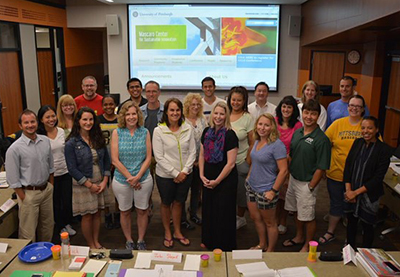 Building a Sustainable World In the Middle School Science Classroom was a two-day summer workshop designed through a collaboration between the Mascaro Center for Sustainable Innovation, the Engineering Education & Research Center, and the Institute for Learning that aimed to inspire school teachers to incorporate sustainability and engineering practices into the middle school science classroom. The workshop exposed teachers to sustainability and engineering through experiential learning and provided materials to help transfer the new information into their classrooms.
Building a Sustainable World In the Middle School Science Classroom was a two-day summer workshop designed through a collaboration between the Mascaro Center for Sustainable Innovation, the Engineering Education & Research Center, and the Institute for Learning that aimed to inspire school teachers to incorporate sustainability and engineering practices into the middle school science classroom. The workshop exposed teachers to sustainability and engineering through experiential learning and provided materials to help transfer the new information into their classrooms.For more information or to discuss how to implement sustainability curriculum within your classroom, please contact Savannah Denlinger (sld127@pitt.edu) or Esmee de Cortie (esmee.decortie@pitt.edu)
- Alcosan Summer Science Program
-
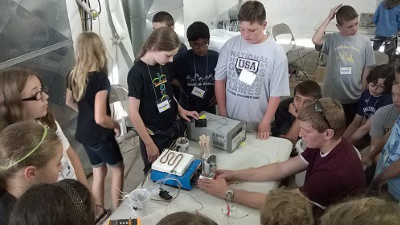 Since 2009 MCSI professors, graduate students and undergraduate students have participated as facilitators and presenters for the ALCOSAN Summer Science program. The program offers students in grades 4-8 an exciting week of hands-on activities and field trips related to the sciences of wastewater treatment and engineering. Each session is designed using Pennsylvania standards for Environment & Ecology as well as Science & Technology and Engineering Education.
Since 2009 MCSI professors, graduate students and undergraduate students have participated as facilitators and presenters for the ALCOSAN Summer Science program. The program offers students in grades 4-8 an exciting week of hands-on activities and field trips related to the sciences of wastewater treatment and engineering. Each session is designed using Pennsylvania standards for Environment & Ecology as well as Science & Technology and Engineering Education. - Allegheny Traditional Academy
-
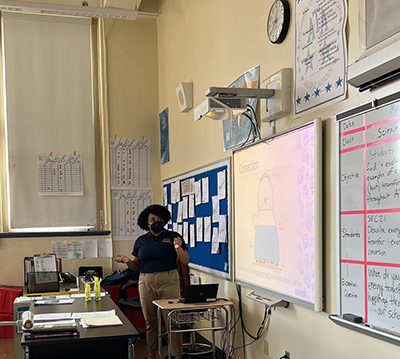 In 2022, The Efficiency Network (TEN) completed a series of renovations at Allegheny Traditional Academy (ATA), a K-8 Pittsburgh Public School, which were designed to enhance the facility's energy efficiency. While this project was taking place, MCSI worked with TEN to develop an energy education program for ATA's students that utilized the renovations being made as an experiential learning opportunity. MCSI hosted four sessions at ATA, with three sessions led by Dr. Melissa Bilec and Jessica Vaden and one session led by Dr. David Sanchez and Emily Albrecht. We also hosted ATA at MCSI and SSOE on several occasions, where they toured the makerspace, watched a demonstration of the laser cutter and 3D printers, built their own mini-hydroponics systems, and competed to design the most efficient windmill.
In 2022, The Efficiency Network (TEN) completed a series of renovations at Allegheny Traditional Academy (ATA), a K-8 Pittsburgh Public School, which were designed to enhance the facility's energy efficiency. While this project was taking place, MCSI worked with TEN to develop an energy education program for ATA's students that utilized the renovations being made as an experiential learning opportunity. MCSI hosted four sessions at ATA, with three sessions led by Dr. Melissa Bilec and Jessica Vaden and one session led by Dr. David Sanchez and Emily Albrecht. We also hosted ATA at MCSI and SSOE on several occasions, where they toured the makerspace, watched a demonstration of the laser cutter and 3D printers, built their own mini-hydroponics systems, and competed to design the most efficient windmill. - Energy Labs
-
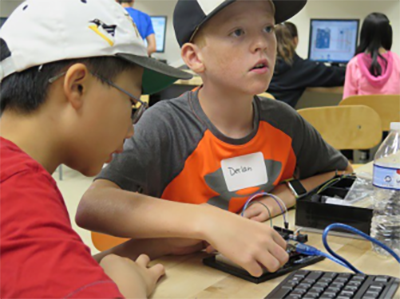 Over 700 students from the University of Pittsburgh, Robert Morris University, local schools, and summer programs were engaged in an innovative energy curriculum which revolved around teams of students designing and building energy technology prototypes. Building upon successful outreach programs enabled by a Mascaro Center for Sustainable Innovation seed grant, the curriculum focused on teaching students fundamental science and engineering concepts by synthesizing our energy curriculum around hands-on “Inventor-Labs.” View photos of the Labs on Flickr.
Over 700 students from the University of Pittsburgh, Robert Morris University, local schools, and summer programs were engaged in an innovative energy curriculum which revolved around teams of students designing and building energy technology prototypes. Building upon successful outreach programs enabled by a Mascaro Center for Sustainable Innovation seed grant, the curriculum focused on teaching students fundamental science and engineering concepts by synthesizing our energy curriculum around hands-on “Inventor-Labs.” View photos of the Labs on Flickr. - Manchester Academic Charter School
-
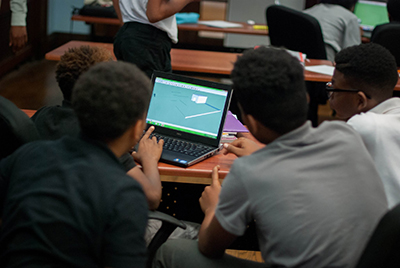 In 2011, MCSI partnered with the Manchester Academic Charter School (MACS) to establish and implement sustainability- and engineering-based educational programs. MCSI faculty and students provided all 6th, 7th, and 8th grade students with a series of lectures on sustainability, green buildings, energy, and water. The students then participated in the first MCSI Sustainable Schools competition, which invited students to identify a concept that would make their school ‘greener’ while increasing sustainability awareness throughout the school. With guidance and mentorship from MACS science teacher Cara Koloshinsky, as well as MCSI post-doc Bhavna Sharma, students worked individually or in teams to develop a proposal outlining how they would make their school more sustainable. Projects were reviewed by MACS and MCSI representatives and were judged based on their quality, creativity, long term impact, and feasibility of implementation.
In 2011, MCSI partnered with the Manchester Academic Charter School (MACS) to establish and implement sustainability- and engineering-based educational programs. MCSI faculty and students provided all 6th, 7th, and 8th grade students with a series of lectures on sustainability, green buildings, energy, and water. The students then participated in the first MCSI Sustainable Schools competition, which invited students to identify a concept that would make their school ‘greener’ while increasing sustainability awareness throughout the school. With guidance and mentorship from MACS science teacher Cara Koloshinsky, as well as MCSI post-doc Bhavna Sharma, students worked individually or in teams to develop a proposal outlining how they would make their school more sustainable. Projects were reviewed by MACS and MCSI representatives and were judged based on their quality, creativity, long term impact, and feasibility of implementation.In 2015, MACS students participated in the annual Future City Competition. MACS social studies teacher Dennis Henderson, engineering mentor Casey Wagner, and MCSI visiting assistant professor Dave Sanchez assisted the 6th, 7th, and 8th grade Future City teams in completing the competition, which challenged students to create a sustainable food system. The MACS student team won the award for Most Sustainable Food Production System.
MCSI has recently engaged MACS students in an annual Energy Inventor Lab activity, which exposes middle school science students to principles of sustainable engineering and design. The Inventor Lab consists of hands-on, interactive design-build challenges, including the fabrication of a miniature solar house.
- Pittsburgh Carmalt
-
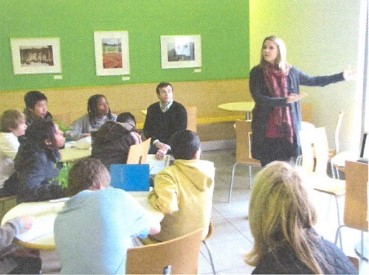 On November 10, 2011, MCSI hosted an educational lesson at Phipps Conservatory for students of Pittsburgh Carmalt, a Pittsburgh public K-8 school that integrates science and technology throughout its curriculum. The Academy's 8th graders were competing in the Future City Competition, which tasks student teams with designing a city of the future and introduces middle schoolers to concepts such as engineering, design, city planning, and sustainability. The Carmalt team was mentored by MCSI doctoral student and IGERT Fellow Michael Richard.
On November 10, 2011, MCSI hosted an educational lesson at Phipps Conservatory for students of Pittsburgh Carmalt, a Pittsburgh public K-8 school that integrates science and technology throughout its curriculum. The Academy's 8th graders were competing in the Future City Competition, which tasks student teams with designing a city of the future and introduces middle schoolers to concepts such as engineering, design, city planning, and sustainability. The Carmalt team was mentored by MCSI doctoral student and IGERT Fellow Michael Richard.The Carmalt students came to Phipps Conservatory to learn about the concepts of sustainability and green buildings. Phipps is recognized as one of America's greenest public gardens and strives to promote sustainability in all aspects of its operation, making it an excellent venue for teaching sustainability. The 8th graders were given a green building tour of the conservatory by MCSI's Dr. Melissa Bilec. Graduate students from MCSI and the Swanson School of Engineering then led students in discussions and activities about energy production and the roles of various engineering disciplines.
- STEAM Days
-
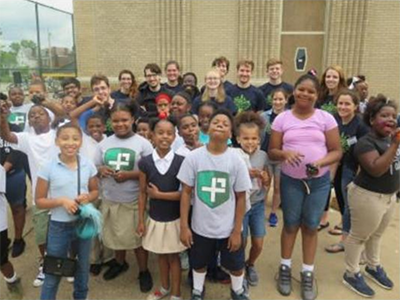 Every summer, MCSI partners with Lincoln Elementary School to engage hundreds of elementary school students in fun, hands-on science demonstrations. MCSI faculty and staff, as well as participants in our Undergraduate Summer Research Program, teach students about hydroponics, water propulsion, chemical reactions, magnetic fluids, clay electronic circuits, and more.
Every summer, MCSI partners with Lincoln Elementary School to engage hundreds of elementary school students in fun, hands-on science demonstrations. MCSI faculty and staff, as well as participants in our Undergraduate Summer Research Program, teach students about hydroponics, water propulsion, chemical reactions, magnetic fluids, clay electronic circuits, and more. - Urban Youth Action
-
Urban Youth Action (UYA), founded in 1966, is dedicated to serving young people by preparing them for the opportunities available in education, employment, entrepreneurship, and public service. Their mission is to provide youth with the opportunity to become "work ready, life prepared, and community minded." MCSI partnered with UYA to present a series of green lectures that provided 9th, 10th, 11th, and 12th grade students with a general understanding of sustainability principles. The lectures, which focused on sustainability, green buildings, energy, and water, worked to engage students through presentations and activities. The MCSI and UYA partnership was an ideal way to teach young people about the concepts of sustainability and the relationship to their community and everyday life.
